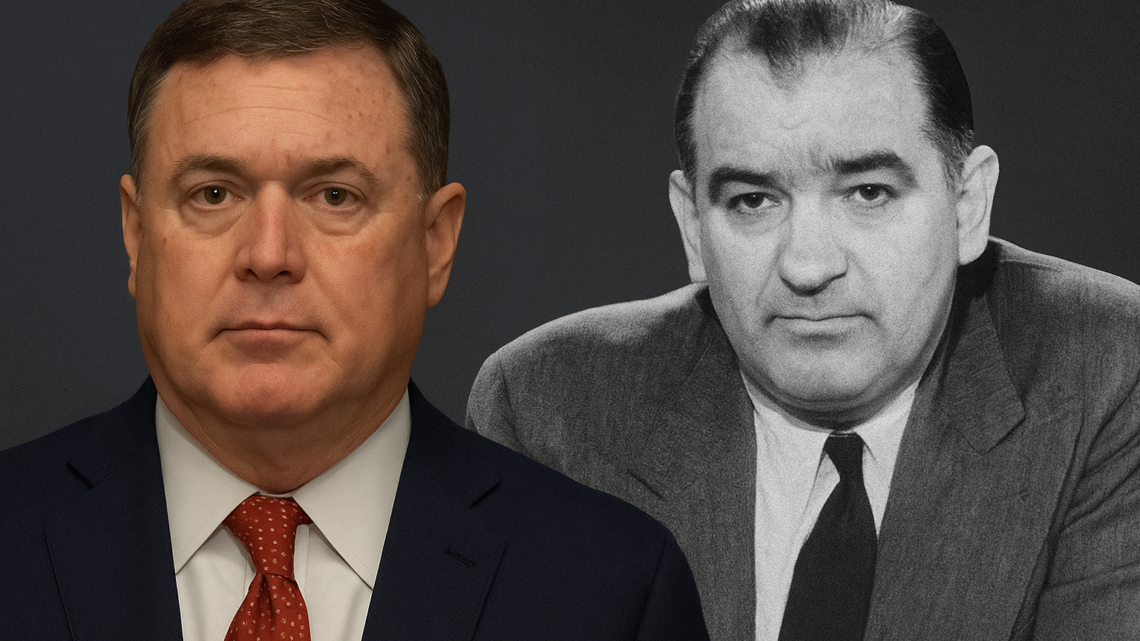By Abdul-Hakim Shabazz | IndyPolitics.org
If you’ve been watching Indiana Attorney General Todd Rokita over the past few years, you might feel a twinge of déjà vu. No, he’s not hunting communists, and this isn’t the 1950s—but the tactics, the tone, and the showmanship would feel right at home in Joe McCarthy’s heyday. And as the classic film and Broadway play Good Night, and Good Luck reminds us, (I watched it last night on Max), unchecked power and fear-based politics never really go out of style. They just get rebranded.
Joe McCarthy’s rise during the Cold War was built on a simple formula: accuse, intimidate, repeat. He used his Senate platform to allege communist infiltration in government and media, often with zero real evidence. Lives and reputations were destroyed in the process. Good Night, and Good Luck chronicled how CBS journalist Edward R. Murrow calmly, methodically dismantled McCarthy’s crusade—reminding America that dissent isn’t disloyalty, and fear isn’t a substitute for fact.
Today, Rokita isn’t conducting televised witch hunts, but the echo is undeniable. He’s turned the Attorney General’s office into an ideological weapon, targeting everyone from a doctor performing a legal abortion on a rape victim, to teachers, health officials, and anyone who steps out of line with his cultural agenda.
Take the case of Dr. Caitlin Bernard. Rokita ran to national media before even filing a complaint, accusing her of misconduct after she legally helped a 10-year-old rape victim obtain an abortion. He was later reprimanded by the Indiana Supreme Court for violating confidentiality rules in discussing the case. The disciplinary process revealed that Rokita had misused his office to score political points—a rare move that resulted in a formal public reprimand, one of the most serious sanctions short of suspension.
Rather than accept responsibility, Rokita cast himself as the victim. He claimed the Indiana Disciplinary Commission was being weaponized by his political enemies and that the process was designed to silence him. Sound familiar? That’s the same deflection tactic Joe McCarthy used when cornered—accuse the accusers, shift the narrative, and play to the base.
Much like McCarthy, Rokita thrives on the politics of accusation. It’s not about proving wrongdoing—it’s about weaponizing perception. Whether it’s railing against “woke” corporations, attacking DEI programs, or threatening schools over curriculum, the pattern is the same: manufacture outrage, escalate rhetoric, and position yourself as the last line of defense against a moral collapse.
Now, is Todd Rokita the second coming of Joe McCarthy? Not exactly. The stakes are different, and Rokita hasn’t faced the kind of national scrutiny McCarthy eventually did. But the structural playbook—turning public office into a tool of political theater, and feeding off division and fear— sounds pretty similar.
The broader issue here isn’t just Rokita. It’s what his brand of politics says about where we are. Good Night, and Good Luck wasn’t just about one senator’s downfall. It was about what happens when the public, the press, and the political establishment fail to draw the line. Murrow’s warning still rings true today: “We must not confuse dissent with disloyalty.”
This isn’t about partisanship. It’s about principle. Whether you lean red, blue, or somewhere in between, the abuse of power and erosion of public trust should concern us all. When attorneys general start behaving more like TV pundits than law enforcement officers, we lose something essential—our faith that the law applies equally and fairly.
So, yes, we’ve seen this movie before. We know how it ends. But whether we let it play out again is up to us. The mic is live. The cameras are rolling. The question is whether anyone, like Murrow, is willing to speak up before the credits roll.
Good night. And, once again, good luck.











